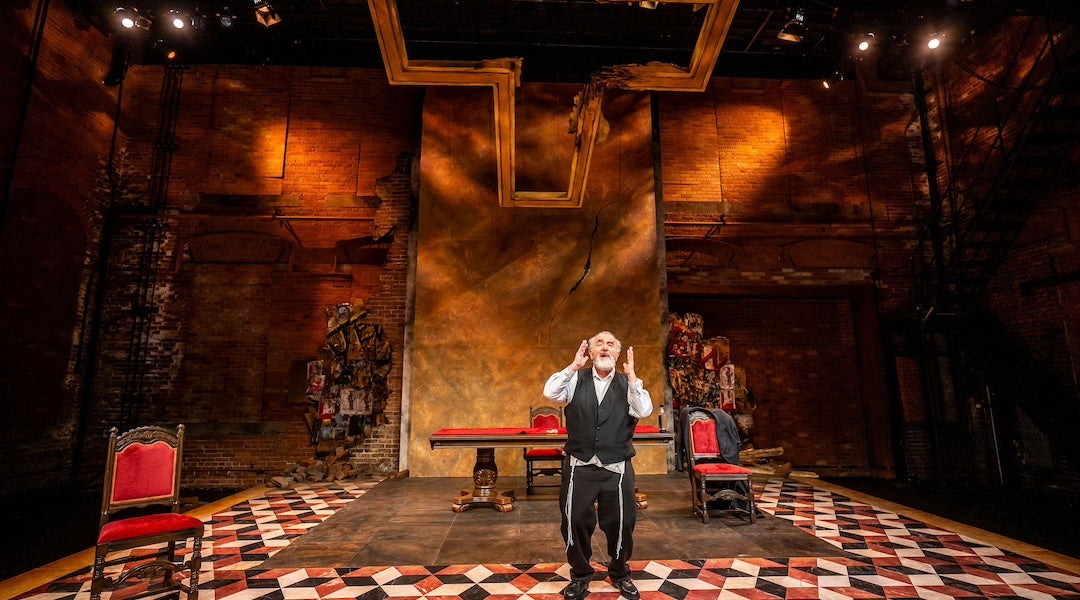When Saul Rubinek walks on stage in “Playing Shylock,” he’s not only playing Shakespeare’s infamous Jew — he’s playing himself. Or rather, a version of himself: a Jewish actor furious that his production of “The Merchant of Venice” has just been canceled for being too controversial.
That conceit — a play about a play that’s been shut down, starring an actor playing a version of himself — is the brainchild of Canadian playwright Mark Leiren-Young, who wrote an earlier one-man show called “Shylock” three decades ago. During the pandemic, in collaboration with Rubinek, Leiren-Young reimagined the play, which opens Thursday at Brooklyn’s Polonsky Shakespeare Center after a critically acclaimed Toronto run.
“My character was ready to come on stage for three minutes,” Rubinek said in a joint interview with the playwright. “Saul Rubinek — the character — just wants to tell the audience that ‘Merchant’ has been canceled and they’ll get a refund. But he can’t leave the stage. He keeps talking. It’s all supposed to feel improvised — but 99.9 % is scripted.”
Over the next 100 minutes, Rubinek, a longtime character actor perhaps best known as Daphne’s mensch-y boyfriend Donny on the 1990s sitcom “Frazier,” delivers a primer on the history of Shakespeare’s most controversial play, a polemic against cancel culture and a meditation on Jewish identity and artistic heresy in the charged years after Oct. 7.
As Shylock — the Jewish moneylender who is scorned and humiliated by the Christian merchant to whom he lends 3,000 ducats under extraordinary terms — Rubinek, 77, wears the velvet kippah, tzitzit and long black coat of a modern-day haredi Jew. He recites some of Shylock’s best-known soliloquies — including “Hath not a Jew eyes,” an appeal to his tormentors’, and the audience’s, conscience — in an Eastern European accent.
Rubinek said he was imagining how his own father, a Holocaust survivor and one-time Yiddish actor who once dreamed of performing “Merchant,” might have played Shylock.
“That gave me the key to Shylock,” said Rubinek, who was born in a displaced persons camp in Germany after World War II, before his family immigrated to Canada. “I’m not really playing Shakespeare’s Jew. I’m playing how I imagine my father would have played him.”
That patrimony only fuels the outrage of the Rubinek character (henceforth called “Saul”) now that an unspecified social media campaign has intimidated the producers into shutting down the production.
The fictional cancellation echoes real-world controversies: In 2014, the Metropolitan Opera cancelled the international simulcast (although not the live performances) of John Adams’s “The Death of Klinghoffer,” about the 1985 hijacking of the passenger liner Achille Lauro by the Palestinian Liberation Front 2014. The producers’ cited concerns that the production could be used to fuel antisemitism.
Just last year, a Canadian theater cancelled a showing of “The Runner,” a play about an Orthodox man who piously collects body parts after terrorist attacks. The theater explained: “Given the current conflict in the Middle East, this is not the time for a play which may further tensions among our community.”
Jewish activists and the family of Klinghoffer, who was killed in the hijacking, put pressure on the Met; it’s not clear which members of the “community” sought to cancel “The Runner.” Similarly, “Playing Shylock” leaves vague who exactly objected to a new “Merchant,” although there’s a strong suggestion it was over-sensitive Jewish interests. Saul describes a grilling he got at “the Jewish community center,” where a Jewish moderator suggests that a play that centers an antisemitic archetype may be too “toxic” to perform.
Saul reacts with fury. “This? This play? With what’s happening? Right here? In this city?” he thunders. “Where you can’t go into a synagogue without passing armed guards — the real danger to ‘well-being’ is ‘Merchant’?”
Responding to a comically diplomatic press release from the theater saying it would be inappropriate to stage “Merchant” at “this time of rising antisemitism,” Saul scoffs.
“Has there ever been a time when antisemitism was not rising?” he says. “When, when was this magical time? Before or after Moses parted the Red Sea?”
Rubinek insists that “Playing Shylock” isn’t just another shot at woke culture, or a version of the dubious complaint by comedians that they can’t joke freely onstage without risking cancellation, or a dig at right-wing politicians and pundits who police what can and can’t be said about the assassination of Charlie Kirk.
“The show isn’t about the left or the right,” Rubinek said. “It’s not Fox News or woke protesters. ‘Merchant’ could have been canceled in 1936, in 1947, in 2016 — it’s always been a lightning rod. The question is, why do we keep trying to silence the art instead of confronting what makes us uncomfortable?”
When the show isn’t defending artistic freedom, it is probing Jewish identity. Saul complains about the number of gentile actors who have played Shylock, from Laurence Oliver to Al Pacino to Patrick Stewart, suggesting that Jewish actors have been overlooked in a misguided effort to downplay the character’s Jewishness. (Although, to be fair, the Jewish actor Henry Goodman was lauded for his turn as Shylock in a 1999 National Theatre production of “Merchant” that came to Broadway, and the Jewish actress Tracy-Ann Oberman starred as Shylock on London’s West End in 2022. Dustin Hoffman played the role in a 1989 London production that transferred to Broadway the following year.)
“In the play, I say I’m committing a kind of heresy,” Rubinek said. “By making Shylock visibly Jewish at a time of rising antisemitism, I’m accused of inciting hatred. But I think it’s the opposite — it’s reclaiming a Jewish story that’s been distorted for centuries.”

“You want to know why actors still do this play?” asked Saul Rubinek, shown on stage at at Brooklyn’s Polonsky Shakespeare Center. “Because Shylock is the first three-dimensional Jewish character in all of literature.” (Dahlia Katz)
For Leiren-Young, the collaboration offered a way to explore a lifelong fascination with censorship and identity. “It’s not just about who’s allowed to stage what,” he said. “It’s about who gets to tell their own story — and whether we still believe in the artist’s right to risk being misunderstood.”
Since the Oct. 7 attacks and the ensuing war in Gaza, Rubinek admits, staging a play about Jewish representation feels fraught. Yet the production, he said, seeks to hold both left- and right-wing audiences “in the same room, breathing together.”
“I’ve had people who see things completely differently — politically, emotionally — come up after and say they felt seen,” he said. “Because the play doesn’t lecture. It includes you in the fiction. You become part of the story.”
Ultimately, the play is a rousing defense of “Merchant,” allowing Rubinek to show off his acting chops — both in Shakespeare’s original language and in Yiddish. Rubinek has little patience for those — a roll call that includes the Jewish critic Harold Bloom and the British actress Judy Dench — who call “The Merchant of Venice” irredeemably antisemitic. Instead, he said, the play demands that audiences see a stereotype as a human being.
“You want to know why actors still do this play?” he asked. “Because Shylock is the first three-dimensional Jewish character in all of literature. Five scenes, and he’s haunted actors for 400 years. Why? Because he’s real.”
“Playing Shylock,” now in previews, opens Oct. 23 and runs through Dec. 7 at Polonsky Shakespeare Center, home of Theatre for a New Audience (262 Ashland Place, Brooklyn).
The New York Jewish Week brings you the stories behind the headlines, keeping you connected to Jewish life in New York. Help sustain the reporting you trust by donating today.




